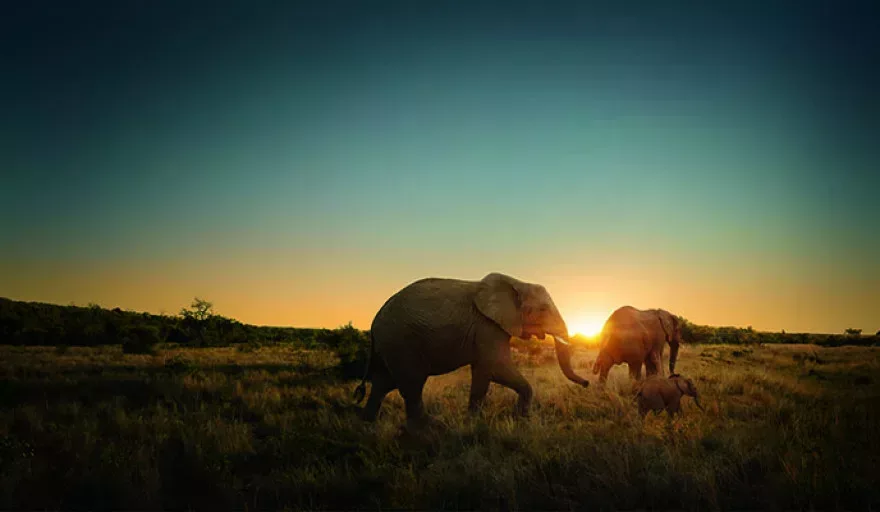Standard Chartered’s Southern Africa CEO Jerry Kweku Bedu-Addo is determined to win the war on wildlife crime, leveraging the power of the company to hit criminals where it hurts the most – their bank accounts
“Southern Africa is blessed with native animal species that have been a huge source of attraction to humanity, from international researchers to tourists from all over the world.
“If you have experienced observing wildlife in their natural habitat, it is a memory you will always cherish. Think of the beautiful wildlife you can see in Hwange National Park in Zimbabwe, South Luangwa National Park in Zambia, Chobe National Park in Botswana or Kruger National Park in South Africa.
“I am talking about the beauty, the serenity and sheer innocence of the various species of wildlife who are simply living their lives. They did nothing to harm our way of life and this should be reciprocal.”
For Standard Chartered’s Southern Africa CEO Jerry Kweku Bedu-Addo, fighting wildlife crime is now part of the day job.
A finance industry veteran whose career has seen him train at the IMF and work for the World Bank and Ghanaian government on economic policy, Bedu-Addo is now based in Johannesburg, having first joined the bank as Executive Director in Zambia in 2004.
Back then he would have been hard-pressed to foresee the impact that wildlife perseveration has had on both Standard Chartered and himself personally, his passion for the cause palpable as he outlines the critical nature of the challenge.
“I do believe that we are reaching a critical point, and this is no longer simply a matter of conservation of local flora and fauna,” Bedu-Addo says.
“It is also about the preservation of the fragile balance between climate and ecology and the biodiversity they support. We risk compromising the quality of life that future generations deserve, and must be responsible custodians of natural resources.
“The scale of the challenge is enormous, and the statistics are alarming. The African elephant, the largest animal walking the earth, is facing a high risk of extinction, with just over 400,000 left in the wild. African elephant populations were severely reduced to current levels because of hunting and the illegal demand for ivory which is the biggest driver of elephant poaching.”
The problem is escalating. In 1989, the Convention on the International Trade in Endangered Species issued a worldwide ban on the trading of ivory, and since then its value has risen by more than 1,000 percent, resulting in an estimated 100 elephants being killed on average every day.
Rhino horn is also extremely valuable on the black market. Estimated to be worth around $65,000 per kilo, demand in Asia in particular is fuelling the epidemic of rhino poaching in South Africa, where illegal activity continues relatively unabated and remains unsustainably high.
The impact of poaching stretches far beyond endangering Africa’s beautiful animals, however.
“This isn’t simply a conservation issue,” says Bedu-Addo. “The reality is that the illegal wildlife trade is an organised crime which fuels violence, drives corruption, and impoverishes communities in the long run. To turn the tide, we need to rethink our approach, and that means recognising that we all have a part to play.”
This includes the financial sector and leading players such as Standard Chartered, the Southern Africa CEO well aware of the power the company can yield.
“The brutal business is now worth billions annually to the criminals behind it,” Bedu-Addo continues. “That means combating the illegal wildlife trade offers an opportunity to better tackle the threat of organised crime and banks like us can play a role.
“It matters to us because our unique footprint as a bank means we’re working in many of the communities most affected by the trade and are therefore on the frontline of the challenge. We as a financial entity have the power to disrupt the business model behind the trade. Its Achilles heel is the very thing that motivates it – the money.
“The need to move, store and realise proceeds gives the financial sector and other stakeholders like governments the power to identify criminal networks via their financial footprints and help close the net. So, the financial system must become attuned to the activity that courses through the system and apply the armoury of tools that they use to fight other financial crimes.”
And Standard Chartered is starting to make a difference in several ways.
In its branches, it is training staff to better spot potentially suspicious transactions relating to the illegal wildlife trade. The company is also prioritising this activity as an area of focus for its financial crime investigators and, through its correspondent banking academies, working with clients to better understand and respond to the issue.
Raising awareness is also crucial. Standard Chartered’s latest brand campaign focusses on the illegal wildlife trade and is spread across 11 countries.
The firm is harnessing the relationships and reach it has with millions of customers around the world, including in many of the countries crucial to the demand, supply, or transit of illegal wildlife products, meaning it can easily draw attention to the damage the trade can cause.
“But no one organisation, government or law enforcement agency can combat wildlife trafficking alone,” Bedu-Addo says.
“We will only succeed if we work in partnership with each other. That’s why coalitions of NGOs, financial institutions and wildlife experts like the United For Wildlife Financial Taskforce are so important. We are proud to have played a central role in its establishment, and we must expand and accelerate partnership action.
“We are hopeful that the world is approaching a tipping point in the efforts to combat the trade. It’s time for the financial sector to take a stand, and by working together we can make a real difference.”































